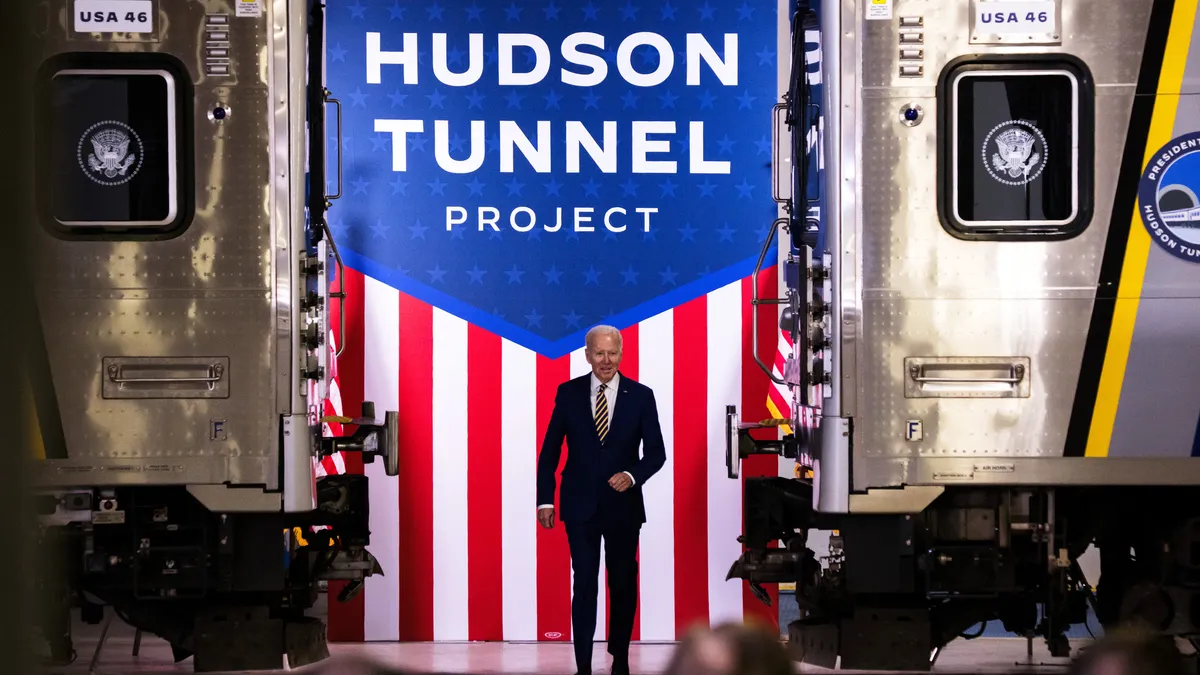Dive Brief:
- Major engineering, design and construction companies reported strong revenues in the recent quarter as money from federal infrastructure legislation reached cities, states and transportation authorities, enabling them to sign contracts with these firms.
- AECOM, Jacobs, Parsons, Tutor Perini and WSP saw revenues up from 9% to more than 30% in the quarter, they reported.
- But even as contracts are signed and billions of dollars flow to transportation and other infrastructure projects, congressional wrangling over fiscal year 2024 federal budget appropriations could derail or delay construction.
Dive Insight:
Legislation passed since 2021, including the Infrastructure Investment and Jobs Act, Inflation Reduction Act and the CHIPS and Science Act, collectively authorized federal investments of nearly $1.9 trillion over a period of years and spurred additional investments from the private sector.
In testimony to Congress in March, American Road and Transportation Builders Association Chair Paula Hammond said that “more than 36,000 transportation improvement projects — including at least one in every congressional district — have moved forward in the past 16 months as implementation of the federal Infrastructure Investment and Jobs Act continues.”
The White House says these projects include clean water infrastructure, public transportation, intercity passenger rail, power grid upgrades, electric buses, roads and bridges, high-speed internet availability, infrastructure resiliency and projects to address legacy pollution.
These investments have been a boon for the companies that design and build those projects:
- Jacobs Solutions reported year-over-year quarterly revenue growth of 9.4%. CEO Robert Pragada told investors on the company’s Aug. 8 earnings call that contracts stemming from the 2021 infrastructure law “continue to accelerate versus the year ago period.”
- Parsons reported record organic revenue growth of 23% year over year in Q2 of 2023, with President and CEO Carey Smith stating on the company’s Aug. 2 earnings call, “We’ve got obviously a very strong $8.9 billion record backlog.”
- WSP Global saw a record-high backlog of $14.3 billion as of July 1. “Since the beginning of 2023, in the U.S. specifically, we recorded an increase of over 20% in contract awards not yet included in our backlog,” said President and CEO Alexandre L’Heureux on the company’s Aug. 9 earnings call.
- AECOM saw revenue grow 13% in the most recent quarter, with revenue from the Americas totaling $2.8 billion. “In the U.S., funding for key infrastructure initiatives is advancing,” said CEO Troy Rudd on the company’s Aug. 7 earnings call. “This includes increasing activity for the IIJA, Inflation Reduction Act, and robust state and local infrastructure investment.”
- Tutor Perini reported revenues up 19% YoY in Q2; however, most of that was due to large mass transit projects in California. On the company’s Aug. 3 earnings call, Chairman and CEO Ronald Tutor said he believes that “a significant commitment of funds [from the IIJA] has yet hit the market.” Instead, he pointed to a number of multibillion-dollar projects that are expected to come up for bid later this year.
Tutor added, “Recent data supports our projections that the U.S. economy continues to be strong and resilient, despite the effects of inflation and higher interest rates, particularly in the area of public works, with diminishing concerns about the threats of a recession. Some of this strength can be attributed to funding toward investments in infrastructure by the bipartisan infrastructure law.”
A Construction Dive report found, however, that the sheer size and number of new multibillion-dollar factory projects spurred by the CHIPS Act is creating labor shortages in construction, especially in certain states, that “threaten to derail both the manufacturing boom and other construction activity in those hubs.”
Parsons’ Smith warned of two possible “headwinds”: Ongoing budget debates in Congress that end in a continuing resolution would cut non-defense spending 1% below the current fiscal year. She also expressed concerns about employee hiring and retention. “Right now, we’re not seeing those [headwinds], but those would be the ones that we would keep an eye on,” she said.
Correction: We have updated this article to correct references to Carey Smith’s gender.













